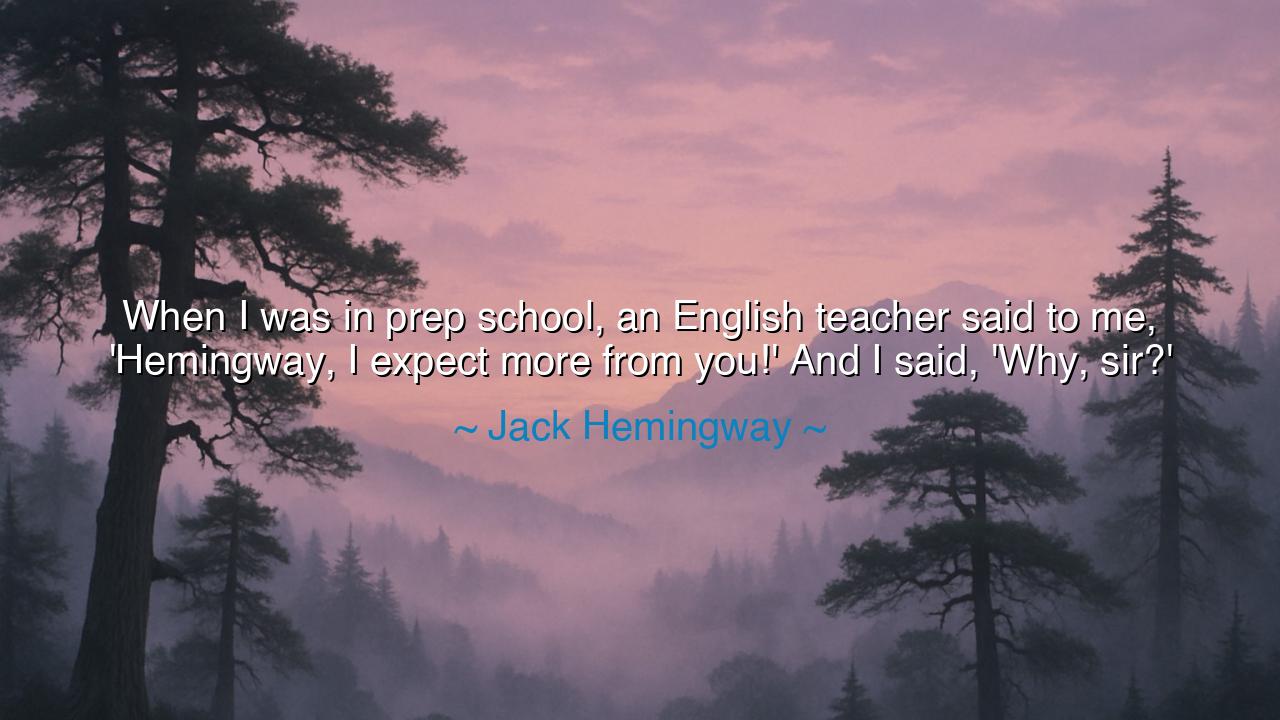
When I was in prep school, an English teacher said to me
When I was in prep school, an English teacher said to me, 'Hemingway, I expect more from you!' And I said, 'Why, sir?'






Jack Hemingway once recalled: “When I was in prep school, an English teacher said to me, ‘Hemingway, I expect more from you!’ And I said, ‘Why, sir?’” At first, this memory seems but a lighthearted tale, a playful exchange between student and master. Yet beneath its humor lies a profound truth about expectation, inheritance, and the weight of a great name. The teacher did not address merely a student; he spoke to the son of a legend, a bearer of the mantle of Ernest Hemingway, whose shadow stretched long across literature. Thus, in that classroom, young Jack confronted a truth that many must face: that the world often judges us not by who we are, but by who came before us.
The teacher’s words were both a challenge and a burden. “I expect more from you!” was not spoken to every boy in the room. It was spoken to Hemingway’s son, as though greatness should flow in the blood like a river. Yet Jack’s humble and questioning reply—“Why, sir?”—reveals the timeless struggle of every soul who walks beneath the towering legacy of others. He asked, in essence: must I be bound by my father’s triumphs? Must I carry the expectations of the world, or may I be judged by the measure of my own deeds? In this question lies the cry of countless heirs, apprentices, and children of renown who long to be free to write their own destiny.
The ancients knew well the burden of lineage. Think of Alexander, son of Philip of Macedon, who inherited not only an empire but the expectation of conquering more than his father. He carried the weight of a world that expected nothing less than greatness. And though Alexander fulfilled this destiny with fire and sword, not all heirs are destined—or willing—to walk such a path. Some, like Jack Hemingway, confront the demand for greatness not with conquest, but with humility and humor. His words echo across generations as a gentle rebellion against the tyranny of expectation.
Yet the quote is not merely about lineage. It speaks also of the universal truth that society often weighs us with demands we did not choose. How many have been told, “I expect more from you”—by teachers, parents, or even by their own conscience? At times these words uplift, calling forth hidden strength. At other times they press down like chains, suffocating the spirit. The wisdom lies in knowing how to respond: not with fear, nor with blind obedience, but with the courage to ask, “Why?” For in that single question lies the power to define one’s own path.
Consider the story of Siddhartha, the young prince who was expected to rule in splendor. His father sheltered him from suffering, expecting him to remain forever in palaces of joy. Yet Siddhartha, questioning this destiny, left his inheritance to seek enlightenment beneath the Bodhi tree. By daring to say, “Why must I follow this path?” he discovered a higher truth that transformed the world. So too, Jack Hemingway’s youthful reply reflects this spirit: the refusal to accept expectation without inquiry, the courage to step beyond another’s shadow.
The lesson is clear: we must not let the weight of expectation crush the soul. Whether it comes from family, teachers, or society, the demand that we must be more—because of who we are, or where we come from—must be tested against the truth of our own calling. If it inspires us, let us embrace it with strength. If it imprisons us, let us question it with courage. To live in the shadow of another is not to live at all; to ask “Why?” is to open the door to freedom.
In your own life, when you hear the words “I expect more from you,” pause before you answer. Ask yourself: is this a call that awakens my spirit, or a chain that binds me? Choose your response wisely. Let expectation shape you when it pushes you toward your true potential, but resist it when it demands you become something you are not. Practice the art of discernment, for the world will never cease to ask more. But the soul must answer in truth, not in fear.
Therefore, remember Jack Hemingway’s reply. It was not defiance alone, but wisdom in seed form. By asking “Why, sir?” he reminds us that every expectation must be examined, not merely obeyed. And in that act of questioning lies the birth of freedom, the strength to walk one’s own path, and the courage to live not under another’s name, but under the light of one’s own becoming.






AAdministratorAdministrator
Welcome, honored guests. Please leave a comment, we will respond soon